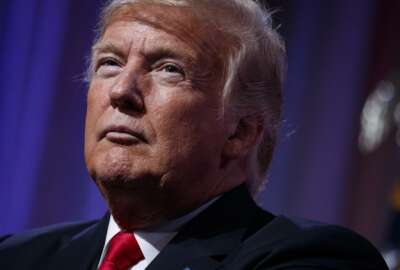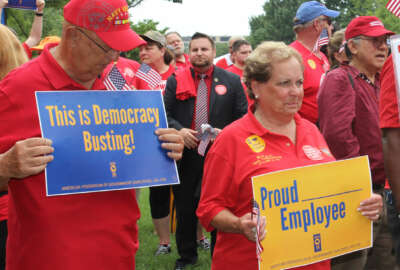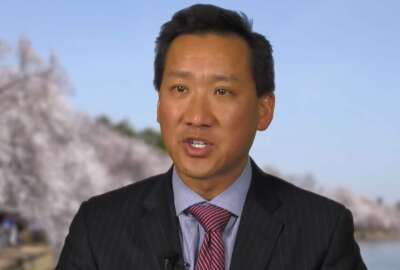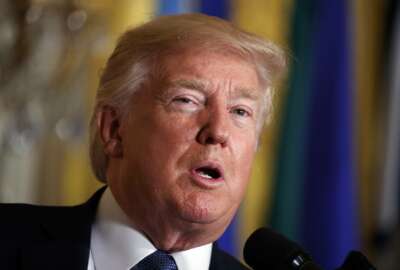
Recent court ruling on Trump EOs may set up further debate over federal collective bargaining
With the federal district court's late-Friday ruling, unions are declaring victory and asking agencies to immediately return to the status quo before the presid...
Best listening experience is on Chrome, Firefox or Safari. Subscribe to Federal Drive’s daily audio interviews on Apple Podcasts or PodcastOne.
With the federal district court’s recent ruling on the president’s three executive orders, unions say they want immediate change. But the battle over federal collective bargaining may just be getting started.
Federal unions are advising their local representatives to begin contacting agency management and negotiators now about how they’ll begin to revoke the provisions in the president’s executive orders on collective bargaining and official time that a federal district judge declared invalid late last Friday.
Both the National Treasury Employees Union (NTEU) and National Federation of Federal Employees (NFFE) said their local representatives are informing agency management about Friday’s ruling and are demanding they comply with the court’s decision.
They expect agencies will immediately return to the status quo ante — or the previous state of affairs before President Donald Trump signed the three executive orders on May 25, NFFE General Counsel Jeff Friday told reporters Monday morning.
NFFE, along with the American Federation of Government Employees (AFGE) and NTEU, had separately sued earlier this summer the Trump administration over the president’s executive orders, which the administration released May 25.
Together, they consolidated their lawsuits and sought summary judgment on four separate motions before the U.S. District Court for the District of Columbia.
“We are expecting these agencies to aggressively move to return these people back to official time and return them back to these offices,” AFGE National President J. David Cox said in a brief interview with Federal News Radio.
The Trump administration, however, may have other plans in mind.
“We are disappointed in the ruling and are considering the appropriate next steps to ensure the President is able to fulfill his constitutional duties, run an effective and efficient government, and protect taxpayers from waste and abuse,” Justice Department spokesman Andy Reuss said in an email.
Still, unions were happy to declare victory on Monday. They said they generally viewed the president’s EOs as an attempt to limit the scope of federal unions, and they’re still concerned about what else the administration might propose.
“The war is far from over, but we are very pleased with the outcome of this particular battle,” NFFE National President Randy Erwin said of the court’s ruling.
Will the administration appeal?
The administration, as federal unions themselves pointed out, may appeal the decision from the U.S. district judge, who was appointed during the Obama administration.
“To date, we have not been notified by the Department of Justice regarding a potential government appeal,” NTEU National President Tony Reardon said in a statement. “Should the government appeal, NTEU is fully prepared to defend its case at the appellate level. In our view, the judge’s decision was thorough and clearly explained that the executive orders overreached and that the president could not undo by executive order the collective bargaining process established by Congress.”
But if the president does choose to appeal, the decision won’t come quickly. And in the meantime, unions and agencies are awaiting guidance on how they address the court’s decision and begin to revoke the provisions the court declared invalid.
The Justice Department didn’t specifically indicate its plans to issue guidance, and the Office of Personnel Management referred all questions about the court ruling to DoJ. OPM had originally told agencies how to implement the provisions of the president’s EOs back in July.
It’s tough to say what federal employees can expect next, because the executive orders were unprecedented, said Heather White, a federal employment attorney for the Federal Practice Group.
In her opinion, Judge Ketjani Brown Jackson said the president didn’t overstep his executive or constitutional authority by issuing EOs on this topic. Instead, she declared nine provisions of the orders as invalid because they specifically conflicted with the message and intent Congress proscribed when it passed the Federal Labor-Management Relations Statute.
“She didn’t blow the whole thing up,” White said of the judge’s decision on the president’s EOs. “She was addressing specific provisions and saying that these are the ones that interfered with management’s ability to negotiate in good faith, and that’s what’s in conflict with the [Civil Service Reform Act].”
White also expects the administration might appeal the judge’s decision, or it could attempt to rewrite the orders and water them down with softer language.
Revoking EOs may be slow
Some agencies with open or rolled-over collective bargaining agreements had quickly implemented some of the EO provisions. The Social Security Administration and Department of Housing and Urban Development, for example, were quick to implement and told unions to vacate federal property.
But others seemed to take a more cautious approach — perhaps waiting for a court decision on the EOs themselves.
With that in mind, it may take agencies a while to respond and begin revoking the provisions of the orders they had implemented.
And though the federal district court invalidated many key pieces of the president’s EOs, there are some repercussions that no court decision could resolve.
The executive orders have certainly heightened the tension between labor and management, especially at agencies like the Health and Human Services and Veterans Affairs departments. Agency labor specialists and union representatives aren’t talking, and they certainly aren’t collaborating.
AFGE has filed a grievance after it and VA couldn’t agree over the terms of their collective bargaining agreement. The Health and Human Services Department declared an impasse after it and NTEU briefly met to discuss new bargaining proposals.
“The landscape has changed considerably,” White said. “This decision may restore some sense of balance, but we don’t know how it’s all going to turn out.”
Copyright © 2024 Federal News Network. All rights reserved. This website is not intended for users located within the European Economic Area.
Nicole Ogrysko is a reporter for Federal News Network focusing on the federal workforce and federal pay and benefits.
Follow @nogryskoWFED
Related Stories






